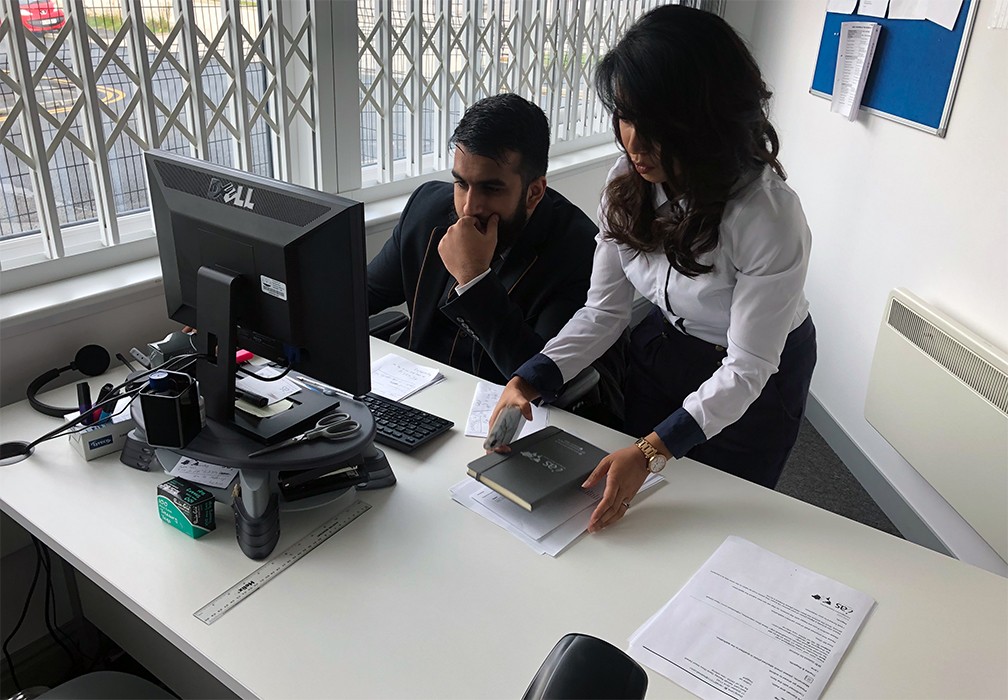Immigrate to Ireland from US - Get Expert Support
Many aspire to immigrate to Ireland from the US for a slower pace of life. With a sense of serenity, safety and abundant work prospects, Ireland is becoming a hub for American expats looking to visit, work, study or conduct business.
If you are a US citizen or resident who would like to move to Ireland, Total Law can help make your relocation to Ireland hassle-free. We can outline the best possible pathway to settlement for you. Contact us today at +1 844 290 6312 or use the online contact form to get in touch.
How to move to Ireland from US?
You can migrate to Ireland from the US via a visa or a citizenship pathway. You can become a citizen by marriage, naturalization, or family. If you are not an Irish citizen or eligible to be so, you must meet the requirements for an Irish visa, which vary depending on your reason for immigrating to Ireland from the US. Various visas allow you to live, work, and study in Ireland. You must ensure your reason for immigrating matches the visa you choose.
Ireland has a thriving job market, and major corporations like Amazon, Apple, and Pfizer have expanded in recent years. The Critical Skills Employment Permit is attractive to American expats in fields like technology, healthcare, and biology who want to use their in-demand skills in Ireland to secure a pathway to permanent residence. At Total Law, we help you determine your eligibility, visa options, and citizenship pathway so you can have peace of mind that you’re in the best possible hands.
What we can help with
Ireland Immigration Solicitors
Applications—We manage your visa application from beginning to end, ensuring the best possible chance of success. We ensure you comply with updated requirements and that your application has all the necessary supporting evidence.
Advice—From determining eligible pathways to managing complex requirements, our experts examine options for your unique circumstances.
Appeals—There is no need to worry if you have been refused a visa; our team can help you get your immigration goals back on track with an administrative review.
World-Class Immigration Services
- Thousands of applications approved worldwide
- Highly qualified & accredited Ireland immigration lawyers
- Fast and friendly lawyers ensure all applications are submitted on time
- Global offices, including Ireland office in Limerick, and US offices in New York and Texas
- Expert assistance from anywhere
- Comprehensive visa and citizenship application services
- Legal representation for complex cases like refusals and deportations
Advice Package
Comprehensive immigration advice tailored to your circumstances and goals.
Application Package
Designed to make your visa application as smooth and stress-free as possible.
Fast Track Package
Premium application service that ensures your visa application is submitted to meet your deadline.
Appeal Package
Ensure you have the greatest chance of a successful appeal. We will represent you in any case.

The Advice Package
During this untimed Advice Session with our professional immigration lawyers in London, you will receive our comprehensive advice, completely tailored to your needs and your situation.

The Application Package
With our Application Package, your dedicated immigration lawyer will advise you on your application process and eligibility. Your caseworker will then complete and submit your forms to the Home Office on your behalf.

The Fast Track Package
Our Fast-Track Application Package is a premium service for those who need to submit their application in time with their deadlines. Your case will become a top priority for our lawyers and you will benefit from our highest-quality services.

The Appeal Package
By choosing our Appeal Package, you can rely on our lawyers’ legal knowledge and experience to ensure you have the highest chance of a successful appeal. We will also fully represent you in any hearings/tribunals.
Ireland Immigration Routes from USA
Visiting Ireland
US citizens can visit Ireland for up to 90 days visa-free for tourism or business purposes. Beyond 90 days, visitors will require a visa consistent with their purpose of travel.
Working, Retiring and Studying in Ireland
If you intend to stay in Ireland beyond 90 days as a US citizen, you must notify the immigration authorities and seek permission based on the scheme or purpose of migrating. You must apply for a study, work, or retirement visa.
If you plan to migrate to Ireland or reside in Ireland for a long period, you must apply for the D-visa category, which has single-entry and long-term possibilities. Various visas in the D category allow you to study, join your family, work, and reside in Ireland permanently. You may also apply for Irish citizenship based on your ancestry or country of birth if eligible.
For any Ireland visa category, you must show evidence that you qualify for the visa and, most importantly, evidence of funds for migration.
Ireland Immigration Process from the US
The first step in processing your emigration plan is applying for preclearance. Preclearance is permission for non-EEA nationals to travel to Ireland and is granted once a visa has been approved for your stay.
Preclearance helps make your immigration process easy. Once your permission is granted, you must visit the Dublin registration office or a local Garda station outside of Dublin to register your permission. You tender your preclearance at the border control and when you want to register your visa for permanent residency.
Whatever your emigration route is, you must apply for immigration preclearance. Once your preclearance is accepted, you will be sent a letter of approval. This letter must travel with you to Ireland and be presented at the border control so that your entry into Ireland can be granted. Preclearance can be granted for any eligible visa.
Irish Work/Employment Permit
As a US citizen, a long-term work permit is another way to migrate to Ireland. The duration of your stay depends on your job and other conditions surrounding it. To be eligible for a work visa, you must have been employed by a company in Ireland. You must possess the skills, education, and qualifications required to get the job.
Usually, they include jobs in high demand, such as health care, natural science, engineering, international trade experts, tech sector, and management specialists. Critical Skills Permits and General Skills Permits have salary requirements. If you have a job offer on the Critical Skills Occupation List or will earn more than 30,000 EUR with a General Employment Permit job offer subject to a Labour Market Needs Test, you have a higher chance of getting a work visa.
When seeking a job, it is important that you tell them your country and that you are currently a US citizen who would need help processing your papers with INIS. Once you have the job contract, the next step is starting your work visa application. If you are migrating to Ireland on an employment basis, your passport will receive immigration ‘Stamp 1’, which permits you to work and operate a business there.
After your preclearance approval, you must apply for your employment permit from the Department of Jobs, Enterprise, and Innovation (DJEI). There are different types of employment permits. They are:
Critical Skills Employment Permit
The Critical Skills Employment Permit is specifically for highly skilled people like ICT professionals, engineers, technologists, etc to work in Ireland. You must have a valid job offer on the Critical Skills Occupation List.
General Employment Permit
The General Employment Permit allows you to work in a broad range of sectors in Ireland. You must have a job offer that has been subject to a Labour Market Needs Test (LMNT) for employers to show the role cannot be adequately filled by an Irish citizen.
Additional Work Permits in Ireland
Intra-Company Transfer Permit
An Intra-Company Transfer Permit allows for the transfer of senior management, personnel, or trainees to Ireland for a multinational company.
Contract for Services Employment Permit
A Contract for Services Employment Permit allows a contractor who has won a contract to provide services to an Irish company.
Reactivation Employment Permit
The Reactivation Employment Permit allows for those who once had a valid employment permit in Ireland but fell out without their fault.
Sports & Cultural Employment Permit
The Sports & Cultural Employment Permit is intended for those involved in cultural and sporting professions.
Internship Employment Permit
The Internship Employment Permit allows those seeking work experience under the Critical Skills Employment Permit.
Ireland Family Visas
If you are in a relationship with a Critical Skills Permit holder
You can apply for a Critical Skills Permit if you qualify for the salary requirements. If not, you may be eligible to work in Ireland by using your permit-holding partner as a sponsor. A Dependent/Partner/Spouse Employment Permit allows a dependent/spouse/civil partner/de facto partner of a Critical Skills Employment Permit holder to apply for any job in Ireland.
If you are in a relationship with an Employment Permit holder
Acquiring a visa with the sponsorship of a spouse or dependent already in Ireland depends on the permit they hold. Most permits, with the exception of Critical Skills and research scientists, will have to wait 12 months before their family can join them in Ireland. Of course, a partner will be able to apply for an employment permit without sponsorship but they must meet the financial & eligibility requirements.
If you are married to or in a civil partnership with an Irish Citizen
If you are married to an Irish citizen, you can immigrate to Ireland based on your relationship. You must write an application letter to the Irish Naturalization and Immigration Service (INIS) to migrate to Ireland based on marriage to an Irish citizen. This letter must be hand-written and sent with your application form and other supporting documents.
If you are in a relationship with an eligible research scientist in Ireland
If you are the spouse/de facto partner/civil partner of a research scientist for an approved research organization in Ireland, you do not need to apply for an employment permit to work in Ireland.
Required documentation for a Join Family Visa in Ireland
- Original marriage/civil partnership certificate.
- Original passport
- Birth certificate
- Original passport and birth certificate of the applicant’s Irish spouse/civil partner
- Evidence that shows the financial ability of the applicant’s sponsor to support themselves and their partner in Ireland.
Once your application is accepted, your passport will receive immigration ‘Stamp 4’, which allows you to work and study in Ireland without restrictions. After that, you will apply for your immigration permission.
Migrating to Ireland as an Irish Citizen by Birth/Descent
If you were born or have ancestors in Ireland, you are eligible for Irish citizenship even if you do not reside in Ireland. You do not need to apply for a visa or be subjected to immigration conditions. You are eligible for Irish citizenship if you were born in Ireland on or before 1st January 2005. You are also eligible for Irish citizenship if one of your parents was an Irish citizen at the time of your birth and you were born outside of Ireland.
If your parents were eligible for Irish citizenship but were deceased at the time of your birth, you are eligible for citizenship. You are also eligible for citizenship if one of your grandparents was born in Ireland. If you were adopted by Irish citizens or a couple where one of the spouses is an Irish citizen makes you eligible for Irish citizenship through adoption.
Study/Student Visa Ireland
As a US citizen interested in migrating to Ireland to study, the first step is to enrol as a student. Depending on the duration of your study program, you may be enrolled for a full-time study of at least 15 hours per week, but this enrollment does not guarantee citizenship. To get a study or student visa, you must provide supporting documents to prove your intention to study. You must have been offered admission or have an acceptance offer from the ILEP (Interim List of Eligible Programs).
The next step is to prove your English qualifications and present your proof of funds. Your study fees must have been paid, and proof of at least 7000 Euros to support your education each year is also required. If you intend to settle in Ireland after your studies, you must meet the requirement of staying in Ireland, typically for up to 5 years. This means successfully applying for a work permit to contribute towards the total time in Ireland before you’re eligible for settlement. Your schooling years do not count when applying for citizenship.
Business Routes to Ireland Migration
There are other routes that a US citizen could use to migrate to Ireland. You can migrate through the Immigrant Investor Programme. This scheme allows you and your immediate family to migrate to Ireland with a minimum investment of €1 million for up to five years.
You can also migrate through the Start-up Entrepreneur Programme. This scheme allows international entrepreneurs with innovative business proposals and funding of at least €50,000 to start a business in Ireland, excluding businesses in retail, personal services, and catering.
Retirement Visa
Retiring to Ireland is another means of migrating to Ireland. Sufficient funds is a major requirement for granting a retirement visa.
You must earn more than 50,000 Euros per year, and if you are relocating with your spouse or husband, you must demonstrate you have double that amount. The income required does not include money held in cash, bank, investment or debt. The retirement visa processing takes a long time because you must provide satisfactory proof of your funds.
Cost of moving to Ireland from the US
Preclearance & Irish Residence Permit Costs
Preclearance in Ireland costs €60 for a single entry or €100 for multiple entries, valid for up to 5 years from the date of issue and valid to stay for up to 90 days. You must then register for an Irish Residence Permit (IRP) costing €300. The stamp you get will show your permissions in Ireland, whether to work, study, retire or live.
If you do not require a work permit for your stay in Ireland, your costs will likely be restricted to the preclearance fee and the Irish Residence Permit fee. However, you must show you have the finances to support yourself during your stay, whether studying or retiring in Ireland.
Overall Settlement Costs
Generally, the cost of working in Ireland for five years and then applying for citizenship through naturalisation can vary from €2735 to €4235, and it can be higher depending on your route. Also, fees are subject to change, so they might be higher when you are eligible for the next steps in your Ireland immigration pathway.
Your employer may pay for the employment permits, in which case the costs are limited to the Preclearance fee, the IRP and the Citizenship through Naturalisation fee.
Employment Permit Costs
Most employment permits in Ireland cost around €1,000 for 12-24 months. It typically costs €750 for a six-month extension or €1,500 for an extension of up to 36 months. You or the employer can pay for a permit. For some work visas, a 90% refund is available if it is rejected.
Citizenship Application Costs
The cost of settling in Ireland from the US can be relatively low. It depends on whether you or your employer will pay the fees for the employment permit or route into Ireland. The Citizenship through Naturalisation process fee is in two parts: €175 to apply and €950 if successful.
How can Total Law Help?
Total Law’s immigration lawyers are highly knowledgeable and experts on the processes of migrating to Ireland. We provide immigration services, advice, and support to make your application process seamless.
Total Law’s Ireland immigration lawyers will help you determine if you meet the eligibility criteria, help you gather the supporting documents, guide you through the interview process and likely questions you may face so that you are confident during the process, and help you file an appeal should your visa be denied.
Call us today on +1 844 290 6312 or use the online contact form to get in touch.
Frequently Asked Questions
Once you arrive in Ireland with your preclearance, you will need to report at the border and prove to the immigration official that you have a valid reason for entering Ireland. You will need to present copies of your supporting documents at the border control, and the immigration officer will decide whether or not to allow you to enter Ireland based on the information provided.
The processing time varies, depending on the type of visa you are applying for. Also, different embassies and visa offices take different times to process different types of visa applications. The time depends on the type of visa you are applying for and the embassy you applied to.









